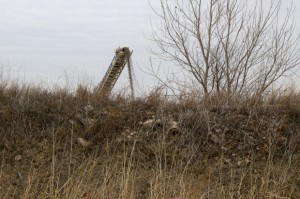
Washed limestone tumbles into railcars behind this artificial berm near Mill Creek, Okla.
Logan Layden / StateImpact Oklahoma


Washed limestone tumbles into railcars behind this artificial berm near Mill Creek, Okla.
Logan Layden / StateImpact Oklahoma

Logan Layden / StateImpact Oklahoma
Washed limestone tumbles into railcars behind this artificial berm near Mill Creek, Okla.
Some landowners frustrated by the expansion of mining in south-central Oklahoma — particularly in the sensitive Arbuckle-Simpson Aquifer — hope a slight change to the state’s mining law will make a major difference in the public’s ability to go up against large sand and limestone mining companies.
The Oklahoma Senate passed that slight change 36-0 late last week. Senate Bill 1184, by Susan Paddack, D-Ada, would change the permitting process at the state Department of Mines, replacing informal conferences with formal public hearings.
Right now, when a new mining operation is proposed, the DoM holds an informal conference where residents and landowners in the area can air their concerns and frustrations. From StateImpact’s March 6 report:
“There’s no admission of evidence, anything,” Ford says. “It’s just kind of a — somebody from the Department of Mines, or sometimes a hearing examiner, just kind of sits in there and listens to everybody.”
After the informal conferences, the Department of Mines decides to issue a permit.
“Those that have participated in the informal conference are notified of this and allowed to file a request for a formal hearing,” Ford says.
So the first formal public hearing doesn’t happen until after the decision to issue a permit is made. For most agencies, the opposite is true.
And it’s at those formal public hearings that evidence is officially presented and testimony taken. Every new mine eventually goes through formal hearings, but Ford thinks holding them before permits are considered by DoM will give the public a better chance to stop a proposed mine — or at least slow down its approval.
Though the DoM’s policy is not to comment on pending legislation, in an email to StateImpact, Minerals Division Director Bret Sholar defended informal conferences, while acknowledging they aren’t the norm.
“The Informal Conference is relatively unique to ODM,” Sholar says. “It has proven effective in opening communication between the mining companies and public, without the initial, unnecessary expense of a legal proceeding.”
SB 1184 now heads to the state House, where Rep. Charles McCall is the principle author. McCall is going up against the aggregate industry on a couple of fronts. He’s also behind a House bill that would allow counties to impose a severance tax on rock and sand.
Clarification: Any earlier version of this story indicated that, after the informal hearing process, the Department of Mines issues a permit. In actuality, after the informal hearing process, the Department of Mines only makes a decision to issue a permit. The permit doesn’t go into effect until after the formal hearing process.